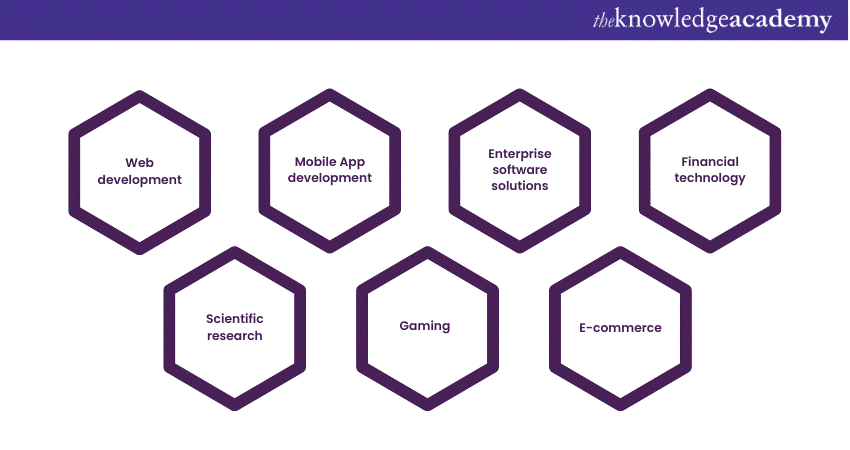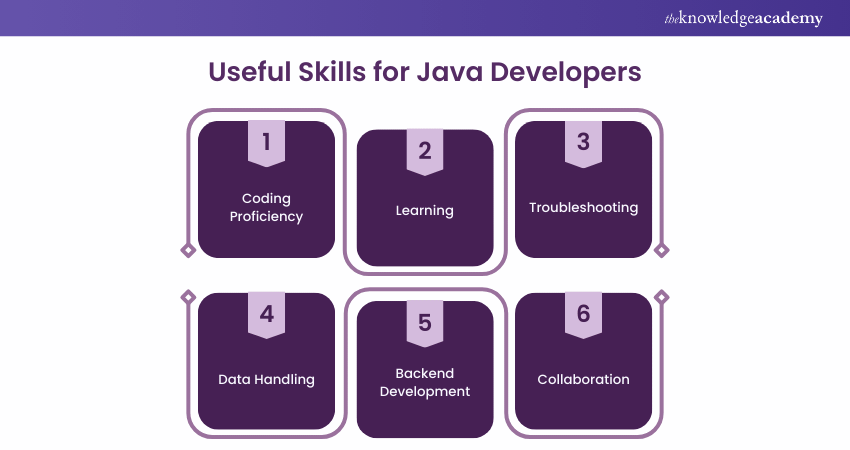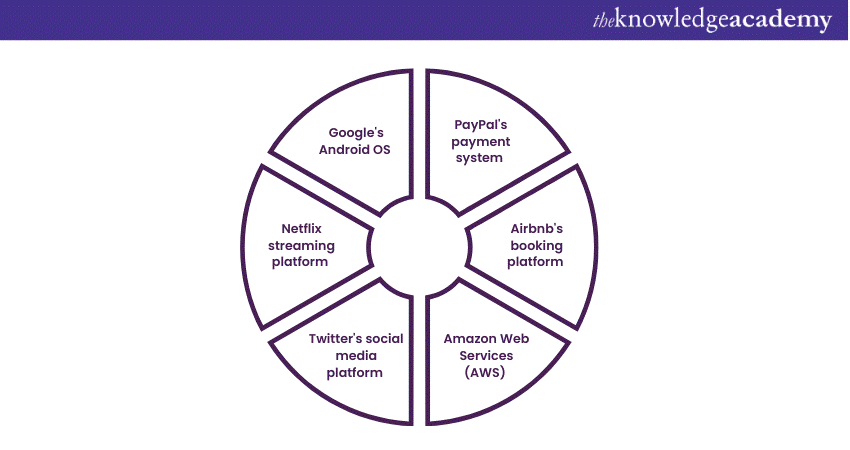We may not have the course you’re looking for. If you enquire or give us a call on +32 35001305 and speak to our training experts, we may still be able to help with your training requirements.
Training Outcomes Within Your Budget!
We ensure quality, budget-alignment, and timely delivery by our expert instructors.

Imagine a transformative spell that helps us communicate with machines and morph simple ideas into cutting-edge digital realities! This is the magic that programming languages wield, and Java stands among the absolute best powerhouses. Since its debut in 1995, Java has remained a stalwart in programming languages boasting unprecedented versatility, stability and security.
A Java Developer uses the Java language to concoct intricate code for creating robust and scalable solutions across diverse industries such as hospitality, video games, social media and more. This blog answers the question ‘What is a Java Developer?’ by exploring their importance, responsibilities, and essential skills while spotlighting their most notable works. Read on and carve your niche in the landscape of programming languages.
Table of Contents
1) What is a Java Developer? An Overview
2) Importance of Java Developers
3) Specific Tasks of Java Developer
4) Useful Skills for Java Developers
5) Notable Works of Java Developers
a) PayPal's Payment System
b) Airbnb's Booking Platform
c) Amazon Web Services (AWS)
d) Twitter's Social Media Platform
e) Netflix Streaming Platform
f) Google's Android OS
6) Conclusion
What is a Java Developer? An Overview
A Java developer is a programmer who is proficient in Java syntax, Object-oriented Programming Principles, and Software Development best practices. They use various tools, libraries, and frameworks to create software solutions across industries, including for roles like Software Engineers and Web Developers.

The tasks of a Java developer involve writing clean, modular, and scalable code. They utilise their in-depth knowledge of Java syntax, libraries, and frameworks to design and implement robust applications. Debugging and troubleshooting are essential aspects of their role, as they identify and resolve issues to ensure the smooth functioning of the software.
They collaborate with cross-functional teams, including Project Managers, Designers, and Testers, to ensure seamless integration and delivery of the final product. Their ability to communicate effectively and work well in a team environment is crucial for successful Software Development.
Interested in becoming a Java Developer? Try our Java Training Courses today!
What is Java Development?
In web development, Java is commonly associated with the Backend, as it handles the data, logic and functionality of the application or website. Backend development manages communication with servers, databases, APIs, and other components hidden from the end user. Although some innovative projects have attempted to bring Java to the client side of things, it is rarely utilised for Frontend Development.
Java enables Web Development through tools like JSP, Servlet and Struts. These tools help develop backend logic, process data, manage database connections, and handle HTTP requests and responses. Consequently, many view Java as a Server-side language.
Here is a table outlining some common tools used in Java development:
|
Category |
Examples |
Description |
|
Frameworks |
Struts, Spring Boot, Hibernate |
They are pre-written code for creating web applications in Java |
|
Web Technologies |
JSP, Servlet |
These are Java-based tech for creating web applications |
|
Programming Language |
Java |
This is the language used to code application logic |
|
Databases |
Oracle, PostgreSQL |
This is where application data is stored |
|
Servers |
Jetty, Tomcat, JBoss |
These are software that handle requests and send responses |
Importance of Java Developers
They play a pivotal role in various industries, contributing to the success of Software Development projects across different sectors. Their expertise in Java Programming enables them to create and implement applications that serve critical functions in these industries. Let's explore who is a Java Developers through the lens of industry applications:

1) Web Development: These professionals are instrumental in creating dynamic and interactive websites. They leverage Java-based frameworks like Spring and JavaServer Faces (JSF) to build scalable and feature-rich web applications that cater to diverse industry needs.
2) Mobile App Development: They are crucial in the world of mobile app development, particularly for Android devices. They utilise the Java Programming language along with the Android platform to build innovative and user-friendly mobile applications.
3) Enterprise Software Solutions: Java's robustness and versatility make it an ideal choice for developing enterprise-level software solutions. Java Developers design and implement complex systems that address the specific requirements of businesses, ensuring scalability, security, and seamless integration.
4) Financial Technology: Java is widely used in the financial industry to create powerful and secure applications. These personnel leverage their capabilities to develop high-performance financial systems, transaction processing platforms, and risk management applications.
5) Scientific research: Java's capabilities make it an excellent choice for scientific research applications. These specialists create software tools and applications that handle large datasets, perform complex calculations, and facilitate data visualisation, supporting advancements in scientific research and analysis.
6) Gaming: Java Developers contribute to the gaming industry by creating desktop and mobile games. They utilise Java game development frameworks to build captivating gaming experiences, leveraging Java's versatility and performance.
7) E-commerce: Java plays a vital role in the e-commerce sector, powering robust back-end systems and enabling secure and scalable online transactions. These specialists create e-commerce platforms, shopping carts, and inventory management systems, ensuring seamless online shopping experiences.
Learn more about programming in Java with our Java Programming Course!
Specific Tasks of Java Developer
While Java can be used for a variety of tasks, its primary role is in Backend Development. This includes creating and managing server-side services and applications that power web and mobile applications. Let's look at some of the tasks a Java Backend Developer may handle on a daily basis:
a) Developing or Integrating APIs: Java's rich ecosystem of tools and libraries helps developers create scalable and flexible APIs, enabling different parts of an application to communicate seamlessly. WebSockets and RESTful APIs are popular Java-based technologies used in API development. Additionally, frameworks like Spring Boot is gaining popularity due to the microservices trend.
b) Managing Databases: A key task for backend developers is designing and implementing database structures that securely hold application data while ensuring efficient performance. Java-based technologies such as Hibernate and Java Persistence API (JPA simplify the development process and makes managing different Database Systems easy.
c) Writing Server-side Code: Java's versatility allows developers to develop custom server-side solutions for processing and managing data. This is achieved using popular application servers like Jetty and Apache Tomcat.
d) Monitoring System Performance: Backend Developers must ensure that servers run efficiently and troubleshoot issues as while they arise. This provides users with seamless experiences. Tools like Java Management Extensions (JMX) are often used to monitor system performance and make necessary adjustments.
e) Collaborating with Frontend Developers: Java Backend Developers must work closely with Frontend Developers. This ensures effective communication and collaboration during creation of applications that are both functional and aesthetically appealing.
f) Developing Security Protocols: Protecting user data from unauthorised access is one of the most persistent challenges. Java Backend Developers utilise secure programming techniques, including Cryptographic Algorithms offered by the Java Cryptography Extension (JCE) library, to encrypt sensitive data.
Useful Skills for Java Developers
A diverse skill set can help you be a proficient Java Developer and overcome any challenges associated with it. Let's explore some of the necessary skills:

a) Coding Proficiency: Java involves writing long strings of code, so being proficient in producing them quickly is essential in improving your efficiency as a developer. Writing concise codes with few errors improves load times and overall performance.
b) Learning: As a programmer, you must consistently adapt to problems and come up with creative solutions to contextually defined unique issues. Effective learning and openness to new solutions is important to remain flexible and adaptable.
c) Troubleshooting: Java Developers often spend considerable time solving issues from multiple angles. This builds patience and skill in troubleshooting and the ability grows with experience.
d) Data Handling: One of the biggest benefits of Java is that it excels in managing large quantities of data. Utilising tools to handle, interpret, and ensure data cleanliness is a valuable skill for enhancing efficiency.
e) Backend Development: Java is primarily a backend framework, so understanding backend processes and their integration with frontend experiences is crucial. Knowledge of other systems and computer science fundamentals can further expand your knowledge base.
f) Collaboration: Effective use of Java involves working closely with other experts and adapting to their needs. It is essential to knowing how to modify code to integrate seamlessly with other parts of a system.
Notable Works of Java Developers
They have made significant contributions in various industries, collaborating with renowned brands and playing a crucial role in the development of their products. Let's delve into more detail about specific real-life use cases where these experts have made a substantial impact:

1) PayPal payment system
Java Developers have played a pivotal role in developing and maintaining PayPal's robust payment system, which facilitates secure online transactions for millions of users worldwide. Java's security features, such as its strong encryption algorithms and secure coding practices, have allowed developers to build a highly secure platform that instils trust and confidence in users when conducting financial transactions.
2) Airbnb booking platform
Java Developers have been instrumental in the development of Airbnb's sophisticated booking platform. Java's versatility and scalability have allowed developers to create a robust and dynamic system capable of handling a vast number of bookings, integrating with various APIs, and providing a seamless experience for both hosts and guests. Java's object-oriented nature has enabled developers to design a flexible and extensible architecture that accommodates Airbnb's ever-growing user base.
3) Amazon Web Services (AWS)
Java Developers have contributed significantly to the development and maintenance of various services within AWS, one of the commonly used cloud computing platforms. Java's performance, scalability, and platform independence have been crucial in building services like Elastic Compute Cloud (EC2), Simple Storage Service (S3), and Amazon DynamoDB. These specialists have leveraged these services to build scalable and reliable applications, empowering businesses with the capacity to deploy and manage their infrastructure in the cloud.
Try our Java Programming and Software Engineering Fundamentals Training Course today!
4) Twitter social media platform
Java Developers have been involved in the development and evolution of Twitter's backend systems. Java's robustness, concurrency features, and support for distributed systems have allowed developers to handle the massive amount of real-time data generated by millions of users. These experts have worked on optimising performance, implementing efficient data storage and retrieval mechanisms, and ensuring the smooth operation of the platform.
5) Netflix streaming platform
Java Developers have made significant contributions to the development of Netflix's streaming platform. Java's scalability, reliability, and support for distributed systems have been crucial in building a platform that delivers high-quality streaming content to millions of users globally. They have implemented advanced streaming algorithms, optimised video encoding and decoding processes, and leveraged Java frameworks to ensure seamless playback experiences across various devices.
6) Google's Android OS
Java Developers have been crucial in developing Google's Android OS, empowering the creation of diverse and innovative mobile applications. Their expertise in Java Programming has shaped the Android ecosystem, enabled seamless app development and delivered transformative experiences to users worldwide.
Conclusion
ope this blog enumerated on who is a Java Developer in detail. Without a doubt, Java Developers are indispensable assets in the Software Development industry. Their expertise in Java Programming enables them to create robust, scalable, and secure applications across various sectors. With their contributions to industry applications, Java Developers drive innovation, efficiency, and success in today's technology-driven world.
Try our Introduction To Java EE Training Course and learn about Java API in detail!
Frequently Asked Questions

Java Developers grapple with challenges such as code verbosity, memory management, and effective handling of multi-threading and keeping up with updates and changes to the Java platform and libraries.

The difference a Full Stack and a Java Developer lies in the primary language, job requirements, salary, certifications and learning difficulty level. Java is easier to learn compared to Full Stack.

The Knowledge Academy takes global learning to new heights, offering over 30,000 online courses across 490+ locations in 220 countries. This expansive reach ensures accessibility and convenience for learners worldwide.
Alongside our diverse Online Course Catalogue, encompassing 17 major categories, we go the extra mile by providing a plethora of free educational Online Resources like News updates, Blogs, videos, webinars, and interview questions. Tailoring learning experiences further, professionals can maximise value with customisable Course Bundles of TKA.

The Knowledge Academy’s Knowledge Pass, a prepaid voucher, adds another layer of flexibility, allowing course bookings over a 12-month period. Join us on a journey where education knows no bounds.

The Knowledge Academy offers various Java Courses, including Java Programming and JavaScript for Beginners Course. These courses cater to different skill levels, providing comprehensive insights into Java Developers.
Our Programming & DevOps Blogs cover a range of topics related to Java, offering valuable resources, best practices, and industry insights. Whether you are a beginner or looking to advance your Java skills, The Knowledge Academy's diverse courses and informative blogs have got you covered.
Upcoming Programming & DevOps Resources Batches & Dates
Date
 Java Programming
Java Programming
Mon 20th Jan 2025
Mon 3rd Mar 2025
Mon 12th May 2025
Mon 14th Jul 2025
Mon 22nd Sep 2025
Mon 17th Nov 2025







 Top Rated Course
Top Rated Course


 If you wish to make any changes to your course, please
If you wish to make any changes to your course, please


